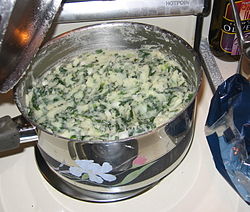 A pot of freshly made colcannon | |
| Place of origin | Ireland |
|---|---|
| Main ingredients | Mashed potatoes, kale or cabbage |

Colcannon (Irish: cál ceannann, meaning 'white-headed cabbage' [ˌkaːlˠ ˈcan̪ˠən̪ˠ]) is a traditional Irish dish of mashed potatoes with cabbage. It is a popular dish on Saint Patrick's Day[1] and on the feast day of St. Brigid.[2]
Description
[edit]Colcannon is most commonly made with only four ingredients: potatoes, butter, milk and cabbage. Irish historian Patrick Weston Joyce defined it as "potatoes mashed with butter and milk, with chopped up cabbage and pot herbs".[3] It can contain other ingredients such as scallions (spring onions), leeks, laverbread, onions and chives. Some recipes substitute cabbage with kale.[4] There are many regional variations of this staple dish.[5] It was a cheap, year-round food.[6][7] It is often eaten with boiled ham, salt pork or Irish bacon. As a side dish it can be paired with corned beef and cabbage.[3]
Colcannon is similar to champ, a dish made with scallions, butter and milk that is traditionally offered to fairies in a spoon placed at the foot of a hawthorn tree.[4]
Etymology
[edit]The origin of the word is unclear. The first syllable "col" likely comes from the Irish "cál", meaning cabbage. The second syllable may derive from "ceann-fhionn", meaning a white head (i.e. "a white head of cabbage."). This usage is also found in the Irish name for a coot, a white-headed bird known as "cearc cheannan" or "white-head hen.".
In Welsh, the name for leek soup is cawl cennin, a phrase combining cawl meaning "soup", "broth" or "gruel", when it is not a reference to the typical Welsh meat and vegetable stew named in full "cawl Cymreig", with "cennin", the plural of "cenhinen", meaning "leeks".[8]
Song
[edit]The song "Colcannon", also called "The Skillet Pot", is a traditional Irish song that has been recorded by numerous artists, including Mary Black.[9][10] It begins:
Did you ever eat Colcannon, made from lovely pickled cream?
With the greens and scallions mingled like a picture in a dream.
Did you ever make a hole on top to hold the melting flake
Of the creamy, flavoured butter that your mother used to make?
The chorus:
Yes you did, so you did, so did he and so did I.
And the more I think about it sure the nearer I'm to cry.
Oh, wasn't it the happy days when troubles we had not,
And our mothers made Colcannon in the little skillet pot.
Similar dishes
[edit]- Clapshot, stovies, and rumbledethumps, from Scotland
- Bubble and squeak, from England
- Champ, from Ireland
- Biksemad, from Denmark
- Trinxat, from the Empordà region of Catalonia, northeast Spain, and Andorra
- Roupa velha (Portuguese for "old clothes"), from Portugal, often made from leftovers from cozido à Portuguesa
- Boerenkool stamppot, from the Netherlands
- Stoemp, from Belgium
- Hash, from the United States
- Hash browns
- Potato cake
See also
[edit]References
[edit]- ^ Beth Dooley (13 March 2024). "4 recipes for a traditional St. Patrick's Day meal, and it's not corned beef". Star Tribune. Archived from the original on 22 May 2024. Retrieved 22 May 2024.
- ^ "If you really want to celebrate Brigid, eat colcannon on Wednesday and then make your cross". The Irish Times. Archived from the original on 22 May 2024. Retrieved 22 May 2024.
- ^ a b Andrews, Colman (21 December 2012). The Country Cooking of Ireland. Chronicle Books. ISBN 9781452124056. Retrieved 31 August 2019.
- ^ a b Sheraton, Mimi (13 January 2015). 1,000 Foods To Eat Before You Die: A Food Lover's Life List. Workman Publishing Company. ISBN 9780761183068. Retrieved 31 August 2019.
- ^ "Recipe from An Bord Bia (Irish food board)". Archived from the original on 19 February 2014. Retrieved 12 May 2011.
- ^ Irwin, Florence (1986). The Cookin' Woman: Irish Country Recipes. Blackstaff. ISBN 0-85640-373-3.
- ^ Friedland, Susan R. (2009). Vegetables: Proceedings of the Oxford Symposium on Food and Cooking 2008. Oxford Symposium. ISBN 9781903018668. Archived from the original on 28 August 2023. Retrieved 31 August 2019.
- ^ Evans, H. Meurig (1980). Y Geiriadur Mawr. Gwasg Gomer.
- ^ Allen, Darina (2012). Irish Traditional Cooking. Dublin: Gill and Macmillan. p. 152. ISBN 9780717154364.
- ^ "The Black Family" CD, 1986, Dara Records, DARA CD 023
External links
[edit]![]() Media related to Category:Colcannon at Wikimedia Commons
Media related to Category:Colcannon at Wikimedia Commons